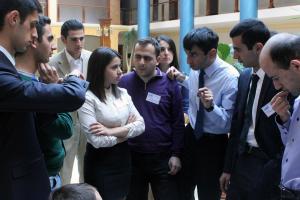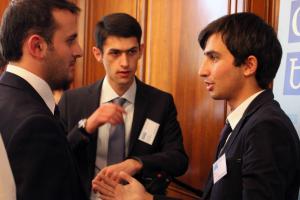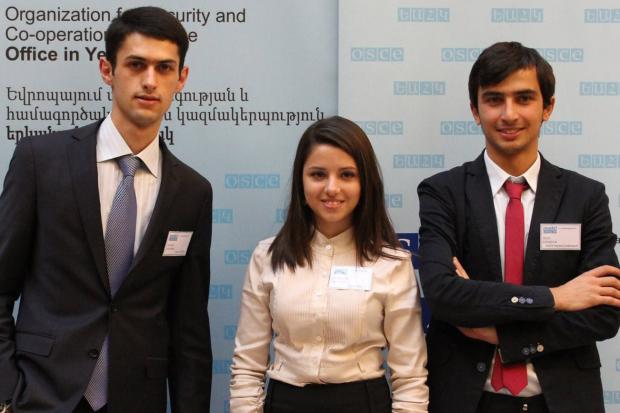“Honorable Ambassador, the floor is yours…”
How the Model OSCE in Armenia helps to achieve personal revolutions
Twice a year, about sixty young Armenians with various backgrounds sit down at the negotiating table to discuss solutions to issues of security and development in the OSCE area. In a series of exercises simulating the work of the OSCE Permanent Council, each of them acts as an “ambassador” of an OSCE participating State.
“I cannot say that we have caused a revolution or brought about a generational change, but being part of the Model OSCE has certainly had a big impact on the lives of our participants,” says Meline Nahapetyan, who co-ordinates youth programmes at the OSCE Office in Yerevan.
The Yerevan office held its first Model OSCE event in 2008 as a follow-up to the first ever international Model OSCE youth conference that took place at the OSCE headquarters in Vienna that year.
I cannot say that we have caused a revolution or brought about a generational change, but being part of the Model OSCE has certainly had a big impact on the lives of our participants.
Meline Nahapetyan, co-ordinator of youth programmes at the OSCE Office in Yerevan
Nadezhda Tsolakyan, 25, was one of the Armenian youth delegates who took part in the Vienna event. She recalls her experience as “breathtaking”.
“I was an undergraduate political science student at the Yerevan State Linguistics University when the first Model OSCE conference was announced. Of course I had heard about the OSCE, but mainly in the context of the Minsk Group and its work on the Nagorno-Karabakh conflict.
When I went to Vienna, I figured I had a pretty good idea of how to go about negotiating, looking for partners and dealing with fellow “ambassadors”. But when the debates started, I realized that it was going to be really tough, as most participants were either students at diplomatic schools or had some previous experience in negotiations techniques.
We also had the opportunity to meet ambassadors of participating States, and the way they delivered their speeches in front of a large audience was quite impressive. I think that was the moment when I decided that I wanted to specialize in negotiations and public speaking.
When I came back to Armenia, I decided to find out more about the OSCE Office in Yerevan, its mandate and activities. I did an internship there and was then offered a four-month contract. This was a very important point in my career as professional trainer."
This was a very important point in my career as professional trainer.
Nadezhda Tsolakyan, participant in Model OSCE
Last year, Tsolakyan together with a group of friends established the NGO Center for Excellence in Negotiation in Yerevan. She now teaches negotiations and public speaking skills to participants in the Model OSCE in Armenia.
Playing for real
Although the Model OSCE events are based on mock scenarios, they always involve debates on real OSCE issues, be it arms control, water pollution, minority rights, democracy, gender or human rights. Scenarios are generally set in regions where the OSCE has field offices, Central Asia, South Caucasus or the Balkans.
“We ask our participants to study and try to understand the position of the country they are going to play,” says Nahapetyan. “We encourage them to do online research and contact consulates and embassies to get the information they are lacking. I have received several calls from embassies, asking me to confirm that the information was being requested for the purposes of our event.”
Young “ambassadors” also receive advice from organizers on their debating styles. “If a participant playing a country which usually keeps a low profile in the Permanent Council is very active and eager to resolve all issues at once, we may either ask him or her to limit the number of statements or play another country,” Nahapetyan explains.
Model OSCE events have two important purposes, she says.
First, they are a great educative tool.
“The negotiation skills that our “ambassadors” practise are life skills; they are important for anyone who wants to succeed in their education and career,” she explains.
Second, they help raise the OSCE’s visibility and boost interest in the organization’s activities among young people in Armenia.
The negotiation skills that our “ambassadors” practise are life skills; they are important for anyone who wants to succeed in their education and career.
Meline Nahapetyan, co-ordinator of youth programmes at the OSCE Office in Yerevan
“We discuss with our participants the OSCE’s concept of comprehensive security and speak about its commitments on human rights and democracy,” Nahapetyan says.
She adds that some of the young people who participated in Model OSCE events are now actively involved in civil society projects in Armenia and have become advocates of human rights.
This year, the Swiss Chairmanship of the OSCE is holding a series of international Model OSCE events. The first was held in January with 57 youth ambassadors each representing one of the 57 participating States.
“This was great news for us. We were happy to provide advice and share the experience we have gathered in the Model OSCEs we have held during the past eight years. I do hope the interest in youth activities will be taken over by the Serbian Chairmanship and will remain a focus of the OSCE,” Nahapetyan says.
Model OSCE in Armenia is an extra-budgetary project implemented with generous contribution from the Delegation of Norway to the OSCE.
Translating theory into practice
This year’s three best participants in Model OSCE in Armenia were subsequently taken on a study tour to Vienna: Alen Shadunts (r), 20, international relations student at the American University of Armenia, Victoria Aydinyan (c), 19, political science student at Yerevan State University and Grigor Chobanyan (l), 21, law student at Yerevan State University.
Most Active Participant
Victoria Aydinyan, 19, political science student at Yerevan State University
I realized the importance of compromise and consensus which are essential in every negotiation process.
Best Special Role
Alen Shadunts, 20, international relations student at the American University of Armenia
I was playing the role of the Chairperson-in-Office. At first, I thought the role would be mostly administrative. However, during the conference I realized that my job was to direct the negotiations so as to avoid a deadlock. I confess it was not easy.
Best Negotiator
Grigor Chobanyan, 21, law student at Yerevan State University
Although I have never participated in such model conferences before, I was entrusted to play the representative of the Russian Federation. The result was a “consensus”, which is difficult to reach in the framework of the OSCE.







